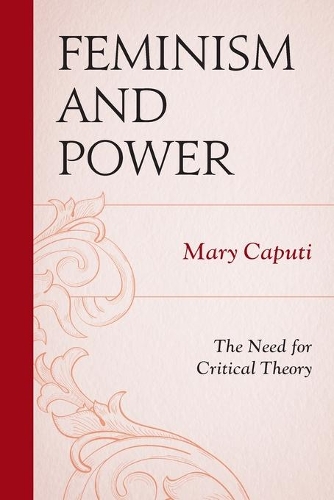
Feminism and Power: The Need for Critical Theory
(Paperback)
Publishing Details
Feminism and Power: The Need for Critical Theory
By (Author) Mary Caputi
Bloomsbury Publishing PLC
Lexington Books
25th March 2015
United States
Classifications
Professional and Scholarly
Non Fiction
Political science and theory
305.4201
Physical Properties
Paperback
218
Width 151mm, Height 230mm, Spine 17mm
327g
Description
Feminism and Power: the Need for Critical Theory is a six-chapter manuscript which offers an important critique of power feminism. The latter, having produced such spinoffs as grrrl power, choice, babe, lipstick, and stiletto feminisms, encourages women to be strong, self-sufficient, feisty, and independent. While I have no argument with much of that tough-minded ideal, I ask whether this brave new girl doesnt too readily acquiesce in a neo-liberal ideology whose underlying tenets derive from American rugged individualism. At its worst, this strain within Third Wave feminism contains no critique of capitalism, no distance on neoliberal theory, no effort to address the injustices contained in globalizations asymmetries and the industrialized Norths exploitation of developing countries. Feminism and Power: the Need for Critical Theory therefore argues that the critical theories of Theodor Adorno and Jacques Derrida have much to offer feminism, and a feminist understanding of female empowerment. Its pages rely on Adornos assertion that it is only by allowing the sufferer to speak that we can unveil social truth rather than be duped by the bravado of victory culture. Similarly, it demonstrates how Derridas insistence on the trace, as well as the asymmetries of friendship and hospitality, lead feminism away from the perils of contented triumphalism. The book promotes listening as a paradigmatic feminist gesture, rather than always speaking up and out.
Reviews
In this rich and engaging work, Caputi takes power feminism to task for its unreflective acceptance of neo-liberalist conceptualizations of choice and power.Drawing effectively on German and French critical theories, Caputi offers a critique of certain aspects of third wave feminism that is intellectually breathtaking, politically engaged and thought provoking. -- Judith Grant, Professor and Chair of Department of Political Science, Director of Center for Law, Justice, and Culture, Ohio University
Caputi (California State Univ., Long Beach) uses critical theory as a lens through which to assess third-wave feminism. Where second-wave feminism emphasized ways that women are victimized, what Caputi terms 'power feminism' celebrates women's victories and newfound status. Simultaneously, however, it is often characterized by a triumphal self-aggrandizement and toughness that ignores the importance of care and the needs of those who are neither listened to nor understood. Although empowerment is positive, its uncritical endorsement reveals a masculinist will to power that is congruent with traditional American cultural icons of rugged individualism. The ethic of care, as developed by Joan Tronto, could serve as a partial antidote and the gender-neutral basis of a society that confronts the damage of neoliberalism and global capital. The critical theory of Max Horkheimer, Theodor Adorno, and Herbert Marcuse, as well as the work of Jacques Derrida, Gayatri Spivak, Julia Kristeva, Morton Schoolman, and others all posit forms of immanent criticism and ways of thinking that recognize 'the other.' Like Odysseus, readers must listen to the Sirens, even while restrained, if they are to replace instrumental rationality with an aesthetic rationality that could restore a hidden ethical dimension of human existence. Summing Up: Recommended. Upper-division undergraduate, graduate, and research collections. * CHOICE *
Author Bio
Mary Caputi is professor of political theory at California State University, Long Beach (CSULB), where she has taught since 1995. Her research interests are in the areas of contemporary political thought, feminism, critical theory, postcolonial scholarship, and cultural studies. Her books include A Kinder, Gentler America: Melancholia and the Mythical 1950s (University of Minnesota Press, 2005) and Voluptuous Yearnings: A Feminist Theory of the Obscene (Rowman and Littlefield Publishers, 1994). She is also the author of numerous articles. In addition to the current book project addressing empowerment in Third Wave feminism, she is also a co-editor and contributor to a forthcoming volume, Derrida and the Future of the Liberal Arts (Continuum, 2013), that analyzes the philosophy of Jacques Derrida in light of the crisis in higher education. In 2009, Professor Caputi spent a sabbatical in Venice, Italy, where she taught a course at the University of Venice, Ca Foscari. In 2010, she received the Outstanding Professor Award from CSULB.
